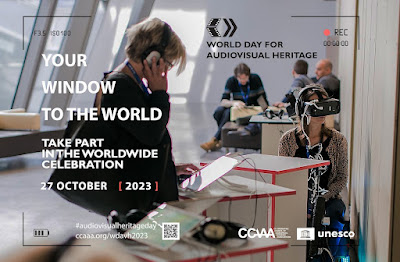 |
| WDAVH 2023 |
Introduction:
As we approach the 27th of October, a date of great significance for audiovisual preservation professionals and institutions around the world, we are thrilled to celebrate the World Day for Audiovisual Heritage. This day represents a key initiative for both UNESCO and the Coordinating Council of Audiovisual Archives Associations (CCAAA) as we come together to honor those who safeguard our heritage, ensuring it transcends time and remains accessible for generations to come.
The Power of Audiovisual Materials:
Audiovisual materials are the vivid threads of our shared history, revealing not only our stories but our truths and our presence in the world. They provide a powerful window into the past, enabling us to witness events we may never have the chance to attend, hear voices from bygone eras that can no longer speak, and shape narratives that both inform and entertain. The rich tapestry of human culture is beautifully woven within these materials, and through them, we gain valuable insights and understanding.
Radio Bantu: A South African Legacy:
This year, the World Day for Audiovisual Heritage is particularly significant for us as we highlight the remarkable preservation endeavors of the South African Broadcasting Corporation (SABC), specifically in the realm of Radio Bantu. In the 1960s, the SABC launched Radio Bantu as a fully-fledged station for African listeners in their various languages, with Zulu being the pioneering language. It was later joined by other vernacular languages, creating a platform that was initially intended to operate as the apartheid state's propaganda channel but soon found resonance among millions of African listeners.
On January 1, 1962, the SABC introduced a high-frequency modulation system, marking the birth of FM radio and 12-hour mass-based broadcasting, incorporating 12 languages, including Zulu, Xhosa, Southern Sotho, Northern Sotho, Tswana, Tsonga, and Venda. The immediacy, accessibility, affordability, and portability of this new format made Radio Bantu an integral part of black popular culture almost overnight.
Preservation Efforts and Challenges:
This was the beginning of iconic regional radio stations such as Radio Sesotho (now Lesedi FM), Radio Zulu (now Ukhozi FM), Radio Setswana (now Motsweding FM), Radio Lebowa (now Thobela FM), Radio Tsonga (now Munghana Lonene), Radio Venda (now Phala Phala FM), Radio Swazi (now Ligwalagwala FM), Radio Ndebele (now Ikwekwezi FM), and Radio Xhosa (now Umhlobo Wenene). These stations have evolved into their current status, contributing significantly to the vibrant media landscape of South Africa.
However, it is with regret that we acknowledge that very little of the invaluable Radio Bantu content has been preserved. This treasure trove of historical audio content is in danger of being lost to time. Nonetheless, a concerted effort is being made to recover and reinstate this collection within the SABC's archives. Regional archivists are tirelessly working to source and retrieve these precious materials. By doing so, we not only ensure the preservation of South Africa's cultural heritage but also contribute to the global initiative of safeguarding audiovisual content for future generations.
Join Us in the Celebration:
The World Day for Audiovisual Heritage is a day of recognition, gratitude, and celebration, and we look forward to your participation in this global effort. Together, we can ensure that the world's audiovisual treasures continue to inspire, educate, and entertain for years to come.
Don't forget to mark your calendar for the 27th of October and join us in celebrating World Day for Audiovisual Heritage 2023!
Link to World Day for Audiovisual Heritage 2023
Learn more about Radio Bantu
Tune in to Radio Bantu Live Stream
No comments:
Post a Comment
We welcome any feedback and comments!